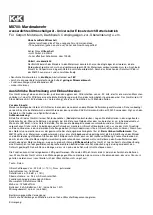
DS41 Owner’s Manual
4
Deep Alarm
To set the deep alarm:
1. Press the
#
key for three seconds. The
display will show:
dAL
OFF
OFF
ON
^
V
V
2. After two seconds the display will indicate
the current Deep Alarm depth setting.
88
50
3. Use the
"
and
#
keys to change the
value. If either key is held depressed for
more than one second the reading will
increase or decrease rapidly.
4. When the alarm is set, exit by pressing
both the
"
and
#
keys simultaneously.
Alternatively, if no keys are pressed for a
period of 5 seconds the normal depth
display will resume.
OFF
OFF
ON
ON
^
^
V
V
Press simultaneously to exit
Note:
If the reading is increased one step above
600 feet (or equivalent) the display will
show
!""
and the alarm will be disabled.
The alarm can also be disabled by
pressing both the
"
and
#
keys for 5
seconds. The word
!""
will be displayed
but the alarm depth will be retained for
future use.
Press for
3 Seconds
Instrument Setup
Keel/Surface Offset
An offset may be automatically added to or
subtracted from the depth reading to
compensate for the location of the transducer.
This allows the instrument to indicate the water
depth relative to the bottom of the keel or the
surface of the water.
To set the keel/surface offset:
1. Apply power while holding down the
"
key.
OFF
ON
ON
^
^
V
Hold down during power up
2. When the unit is on, release the
"
key. The
display will indicate if the current offset is
keel offset or waterline offset:
Hull Offset (Depth below the keel)
Surface Offset (Depth below the surface)
3. After 5 seconds the display will indicate the
current offset.
Note:
A negative offset is used to display depth
below the keel and a positive offset is
used to display depth below the surface.



































